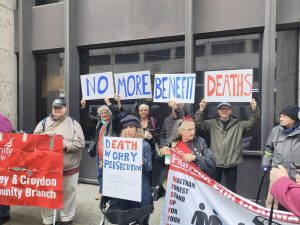Security guards at Department for Work and Pensions (DWP) Jobcentres are gearing up for a fresh round of pay strikes. The staff members work for the notorious global firm G4S – that owns the DWP’s outsourced contract for Jobcentre security. Of course, it also means more DWP Jobcentre closures and delays which could impact vulnerable claimants. But crucially, the strikes once again lay bare the toxic culture at the heart of the DWP.
DWP Jobcentre closures as G4S staff strike
As the Mirror reported:
Job Centre security guards will launch a fresh strike on Monday in a long-running dispute over pay. The GMB said more than 1,500 of its members will stage their fourth week-long walkout, remaining on strike until Saturday.
The union said the guards, employed by private firm G4S, do a dangerous job, adding that 90% of them are paid just the minimum wage.
The new strikes – starting Monday 29 July – follow previous strikes in June and on 1 July.
Of course, G4S’s exploitative treatment of its staff should come as no surprise. It’s yet another cautionary tale of public sector privatisation.
As the Canary’s HG previously highlighted:
the amount the DWP paid G4S is £211m, but employment costs are far less that that, at £161m. This suggests that G4S are taking a hefty £50m profit.
In other words, G4S is paying its staff paltry minimum wages, while pocketing millions in profits. What’s more, the GMB has also pointed out that the firm is forcing a real-terms pay cut on employees, while pushing them to do unpaid training. In particular, according to the Mirror:
The GMB claimed G4S is in breach of minimum wage laws by insisting on unpaid training at home, which the company denied.
The knock-on effect is there may be DWP Jobcentre closures, as the department previously said. Claimants should check with their local branch via phone, before attempting to visit in person.
G4S: a history of scandal
Again however, these exploitative practices are entirely on brand for the private security company. Notably, G4S has a history of scandal.
The firm has profiteered off of multiple arms of the UK’s carceral infrastructure – from immigration detention to the criminal justice system. In each instance, the company has been dogged by rap-sheet of purported misdeeds.
Its detention centres have been rife with allegations of rights violations. A 2021 inquiry over G4S’s running of Brook House detention centre found a violent and racist culture of abuse towards detainees.
In another previous case, the Serious Fraud Office fined the company £44m for multiple counts of fraud. G4S had repeatedly committed this against the UK government in contracts for the Ministry of Justice. It was over the company misleading and overcharging the MoJ for the electronic tagging of prisoners.
Now, the security firm is turning its profiteering extortion on its own staff. Naturally, it’s screwing over those on the bottom rung of its pay ladder – and claimants, too, thanks to potential DWP Jobcentre closures.
Securitisation of welfare
Significantly however, as the Canary’s HG rightly previously raised:
The more important question should be, why do Jobcentre’s need security guards in the first place? Unfortunately, the answer is simple. The DWP backed up by the Conservative government has created a system which is entirely unfit for purpose.
Because at the end of the day, G4S is the private arm of a failing, disgraceful DWP, swimming in allegations of rights violations itself.
In that way, the DWP and the private company profiteering off of shafting its staff make good bedfellows. One is browbeating Labour’s “back to work” agenda. The other is illustrating precisely why people need to access social security services in the first place.
Whether its insecure work, or the securitisation of the welfare state at large, both are dripping in a toxic culture of violence. Of course, with potential DWP Jobcentre closures, it’s claimants that suffer – again.
Ultimately, it all only further highlights why the private security firm – and its staff – should be nowhere near UK public services, least of all its welfare state.
Feature image via the Canary




